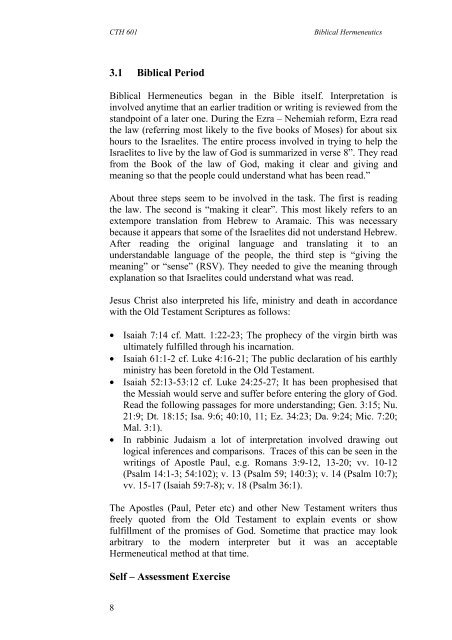Biblical Hermeneutics - National Open University of Nigeria
Biblical Hermeneutics - National Open University of Nigeria
Biblical Hermeneutics - National Open University of Nigeria
Create successful ePaper yourself
Turn your PDF publications into a flip-book with our unique Google optimized e-Paper software.
CTH 601 <strong>Biblical</strong> <strong>Hermeneutics</strong><br />
3.1 <strong>Biblical</strong> Period<br />
<strong>Biblical</strong> <strong>Hermeneutics</strong> began in the Bible itself. Interpretation is<br />
involved anytime that an earlier tradition or writing is reviewed from the<br />
standpoint <strong>of</strong> a later one. During the Ezra – Nehemiah reform, Ezra read<br />
the law (referring most likely to the five books <strong>of</strong> Moses) for about six<br />
hours to the Israelites. The entire process involved in trying to help the<br />
Israelites to live by the law <strong>of</strong> God is summarized in verse 8”. They read<br />
from the Book <strong>of</strong> the law <strong>of</strong> God, making it clear and giving and<br />
meaning so that the people could understand what has been read.”<br />
About three steps seem to be involved in the task. The first is reading<br />
the law. The second is “making it clear”. This most likely refers to an<br />
extempore translation from Hebrew to Aramaic. This was necessary<br />
because it appears that some <strong>of</strong> the Israelites did not understand Hebrew.<br />
After reading the original language and translating it to an<br />
understandable language <strong>of</strong> the people, the third step is “giving the<br />
meaning” or “sense” (RSV). They needed to give the meaning through<br />
explanation so that Israelites could understand what was read.<br />
Jesus Christ also interpreted his life, ministry and death in accordance<br />
with the Old Testament Scriptures as follows:<br />
• Isaiah 7:14 cf. Matt. 1:22-23; The prophecy <strong>of</strong> the virgin birth was<br />
ultimately fulfilled through his incarnation.<br />
• Isaiah 61:1-2 cf. Luke 4:16-21; The public declaration <strong>of</strong> his earthly<br />
ministry has been foretold in the Old Testament.<br />
• Isaiah 52:13-53:12 cf. Luke 24:25-27; It has been prophesised that<br />
the Messiah would serve and suffer before entering the glory <strong>of</strong> God.<br />
Read the following passages for more understanding; Gen. 3:15; Nu.<br />
21:9; Dt. 18:15; Isa. 9:6; 40:10, 11; Ez. 34:23; Da. 9:24; Mic. 7:20;<br />
Mal. 3:1).<br />
• In rabbinic Judaism a lot <strong>of</strong> interpretation involved drawing out<br />
logical inferences and comparisons. Traces <strong>of</strong> this can be seen in the<br />
writings <strong>of</strong> Apostle Paul, e.g. Romans 3:9-12, 13-20; vv. 10-12<br />
(Psalm 14:1-3; 54:102); v. 13 (Psalm 59; 140:3); v. 14 (Psalm 10:7);<br />
vv. 15-17 (Isaiah 59:7-8); v. 18 (Psalm 36:1).<br />
The Apostles (Paul, Peter etc) and other New Testament writers thus<br />
freely quoted from the Old Testament to explain events or show<br />
fulfillment <strong>of</strong> the promises <strong>of</strong> God. Sometime that practice may look<br />
arbitrary to the modern interpreter but it was an acceptable<br />
Hermeneutical method at that time.<br />
Self – Assessment Exercise<br />
8

















